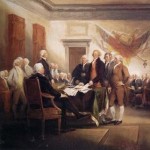The Founders Were No Libertarians
 Christopher Beam's new article on libertarianism makes one key mistake: the Founders weren't libertarian. In fact, they saw first-hand the failure of such ideas.
Christopher Beam's new article on libertarianism makes one key mistake: the Founders weren't libertarian. In fact, they saw first-hand the failure of such ideas.
Christopher Beam has written a thought provoking, well-argued piece in a mainstream liberal magazine on libertarians. Libertarians, as he notes, get a lot of flack from a lot of people. But as a liberal critic of libertarianism he makes a certain mistake that bothers me when libertarians use it and that is equally wrong coming from him. The Founders were not libertarians. They were constitutionalists.
Beam writes that the libertarians have not been so strong since the early days of the Republic. He states “The Constitution was a libertarian document that limited the role of the state to society’s most basic needs, like a legislature to pass laws, a court system to interpret them, and a military to protect them.” This is not true. It limited the federal government to certain roles but not “the state.” He does note that John Adams and Alexander Hamilton were not libertarians but John Marshall is ignored, and even the other Virginians do not meet the test.
In fact, this assertion confuses constitutionalists with libertarians. George Washington belonged to the Established Church (Episcopalian) of the State of Virginia; he also was the chief vindicator of national power in the new republic. Thomas Jefferson determined to wage war by simply denying foreigners the right to trade with the U.S. So did Madison. What libertarian has ever thought the government could cut off trade between free individuals? Further, Thomas Jefferson and Thomas Paine supported the French Revolution. That revolution denied there was anything the state could not do in the name of the people. Jefferson never repudiated his support for that tyranny and Thomas Paine was only slightly more dismissive even after it nearly killed him. Of all the Founders, Patrick Henry is closest to the libertarian beau ideal. He was against the king, against the Constitution and against the French Revolution all of which he saw as an assault on traditional liberties. But for all of the Virginians, I leave aside the issue of slavery entirely. Similarly, libertarians have only a vague relationship to the “second founding” of the 13th, 14th and 15th Amendments. On the plus side, by their lights, it got rid of slavery; on the negative side it gave the federal government the power to enforce such elimination and concomitant political and social rights.
The Founders believed in carefully delineated federal powers either broad (Hamilton) or limited (Jefferson, sometimes) but all believed in a more powerful state than libertarians purport to believe in. If ever there was a libertarian document it was the Articles of Confederation. There was no national power. The federal government could not tax. Its laws were not supreme over state laws. It was in fact, the hot mess that critics of libertarians believe their dream state would be… and it was recognized as such by the majority of the country and was why the Constitution was ratified. The Articles of Confederation is the true libertarian founding document and this explains the failure of libertarianism.
Libertarianism, either ancient or modern, flounders on its ability to deal with families or foreigners. Libertarian solutions are often the right answer to many economic and social questions but the philosophy has proven again and again it cannot deal with tyrants, teenagers or two-year olds. What is the libertarian approach to broken homes, and to attaching children to their fathers in general? To the education of children to promote a libertarian society? How do libertarians deal with bad actors abroad? Apparently by letting them have their way until they attack the United States directly, and not even then, (as we see by libertarian opposition to the Afghan war). Modern wars have sometimes required a draft. Libertarians balk at this. Thus libertarian government always stands vulnerable to foreign conquest and the loss of rights and autonomy that entails.
Libertarianism appears to be like arsenic, a stimulant in small doses but deadly poison when taken in large doses. For this reason, as a broad based political movement, libertarianism will always end up rolling Mr. Beam’s twelve-sided die in its mom’s basement because it fails when the family or the state are under threat.